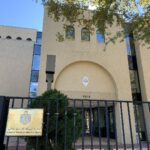In an unusually public and sharp rebuke, London’s Mayor Sadiq Khan has publicly accused former U.S. President Donald Trump of being “racist, sexist, misogynistic and Islamophobic”, after Trump used his address to the United Nations General Assembly to launch a personal attack against Khan and claim that London was being overtaken by what he described as “Sharia law”. This sharp exchange, while headline-grabbing, is not merely a feud between two public figures. It is emblematic of deeper ideological battles over immigration, religion, multiculturalism, and urban leadership in a polarized political era.
The Provocation: Trump’s Framing of London
Speaking at the UN General Assembly, Trump referred to Khan as a “terrible, terrible mayor” and claimed that under Khan’s leadership, London was sliding toward what he framed as the imposition of Sharia law, according to The Guardian. Trump’s rhetoric positioned Sharia as a threatening and destabilizing force, often used in political narratives that portray Islamic values as incompatible with Western democracies.
In reality, Sharia in the UK operates in voluntary, community-based advisory settings with no official legal status. However, Trump’s framing was not based on legal specifics but on invoking a broader fear of cultural change. His comments were part of a wider speech in which he also criticized Britain’s energy policies and governance, but it was the attack on Khan and the reference to Sharia that drew immediate global attention.
Trump has used similar language in the past, frequently suggesting that Muslim leaders or communities represent a threat to Western values. In this instance, Khan was once again made the focal point of that narrative.
Khan’s Response and Strategic Positioning
Khan responded by directly confronting the accusations. Speaking to the BBC, he asked why Trump appears to be so fixated on him, especially as a Muslim mayor, suggesting the obsession reveals more about Trump’s worldview than about London’s reality. He accused Trump of consistently using divisive language and said that anyone paying attention to Trump’s record should take his words at face value. Khan described Trump’s remarks as evidence of entrenched racism and Islamophobia.
In addition to criticizing Trump, Khan also implicitly called out the lack of support from British political leaders. He argued that the UK’s so-called special relationship with the United States should not prevent leaders from speaking up when American figures undermine British values or promote harmful stereotypes.
Khan took the opportunity to reaffirm London’s identity as a vibrant, multicultural, and open city. He rejected the idea that Trump’s version of events could shape how London or its leadership is defined internationally.
The Political and Diplomatic Stakes
This was not a private disagreement, but a highly public confrontation with significant political and diplomatic consequences. Domestically, the attack placed pressure on UK political leaders to clarify their stance. While some Labour MPs rallied behind Khan, Prime Minister Keir Starmer’s government has so far avoided taking a clear position, likely wary of jeopardizing diplomatic relations with a potential future U.S. administration.
On the international stage, the exchange reveals how issues of race, religion, and urban identity are now part of global political rhetoric. Trump’s statements resonate with nationalist and anti-immigration audiences far beyond the U.S., and his framing of Sharia and Muslim political figures reflects broader populist tactics. By elevating Khan as a symbol of what he opposes, Trump attempts to turn London into a warning sign of multiculturalism gone too far.
Khan’s refusal to accept that framing may inspire other local and minority leaders to assert their own narratives in the face of high-profile attacks. At the same time, it also places such figures at the center of volatile and often international culture wars.
A Broader Symbolic Conflict
The debate is not just about governance or policy but about what London, and cities like it, represent. As a Muslim mayor leading one of the world’s most globally connected cities, Khan represents a model of leadership that is inclusive, cosmopolitan, and rooted in diversity. That makes him a powerful counterexample to the type of political vision advanced by Trump and similar figures.
Islamophobic abuse directed at Khan has already increased sharply in recent years. According to analysis earlier in 2025, references to Khan in abusive social media posts have more than doubled, with most of the content coming from within the UK itself. Trump’s remarks are likely to embolden those who see Khan’s leadership as threatening or illegitimate, despite his democratic mandate and sustained public support in London.
Khan’s assertive pushback is both a personal defense and a political message. It signals that he refuses to be reduced to the caricature used by political opponents and that he will not allow outside voices to define his leadership or his city.
A Final Note: Defining the Identity of Global Cities
This confrontation is ultimately about who gets to shape the narrative of a global city. Khan has made his position clear. He stands by London’s openness and diversity, and he is pushing back against the idea that religious or ethnic background makes a leader any less legitimate.
By reframing Trump’s comments as part of a larger ideological attack, Khan is asserting control over how his city is perceived. In doing so, he reminds us that cities are not just physical spaces, but symbolic arenas where the future of democracy, identity, and belonging are contested.










